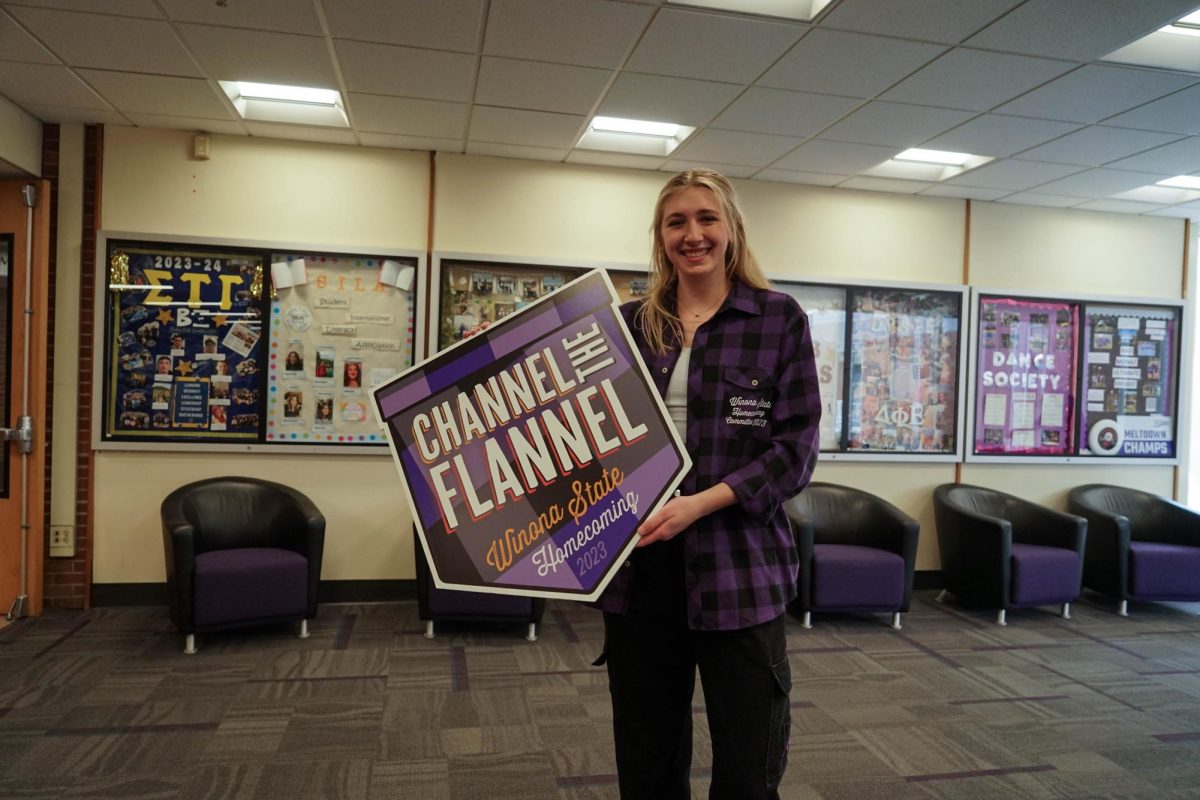
Olivia Volkman-Johnson/Winonan
Winona State University Student Senate has been grappling with the debate over whether the outcome of elections and votes should be based on the popular vote, or a governing body of delegates.
Student Senate held its fourth Warrior Debate last Tuesday in the Phelps Hall TV Studio. The debate focused around the question, “Should elected officials support the majority vote of their constituents even if it conflicts with their own judgment?”
Moderated by professor Kara Lindaman, the debate featured two teams of student senators—Max Gonzalez and Megan Grochowski versus Adam Thompson and Chris Latzig—who answered audience questions and defended their position on the topic.
Gonzalez and Grochowski, a junior and pre-pharmacy student, advocated for being a delegate for Winona State students by taking public opinion into consideration.
“Our jobs are to gather the opinions and feelings of our constituents in each of our colleges,” Grochowski said. “So that way, when we come to our weekly senate meeting, we can represent all of those voices and come to a mutual consensus.”
Though Gonzalez, a junior Spanish and psychology major, agreed, he said he also believes a balance between public opinion and personal opinion is best when making decisions.
“If you’re going to be an elected official, you’re going to be put into some hard positions, and it’s important to know when you should be going with the majority and when you should be voicing your own opinion a little bit too,” Gonzalez said.
Thompson, a junior education major, and Latzig, a sophomore, argued for a ‘board of trustees’ approach by making decisions they feel are in the best interest of Winona State students.
“Whether we’re looking at student senators, representatives, senators or presidents, I think it’s important that we can trust our representatives to make the best decision,” Thompson said.
The debate covered some Student Senate concerns, including the recently denied proposal of a Chik-Fil-A in the Smaug of Kryzsko Commons and the role of Winona State students in these decisions.
“I think that the public role serves as a good basis to start off of, [but] following the public opinion sometimes is very misleading because that is putting your trust in the public that they are informed,” Latzig said.
Some Winona State students believe Student Senate could have done more to inform students on this controversial issue.
Haley Winner and George Bennett, first-year exercise science students, said they were unaware of the dissension surrounding the proposal.
“I don’t think a lot of students knew about what was going on with Chik-Fil-A,” Winner said. “I really didn’t hear about it at all until I went and asked about it.”
“I heard that there was a big chance that Chik-Fil-A was going to be in the Smaug and then the next thing [I knew] it was just not going to happen,” Bennett added.
Sophomore English writing student Cassie Douglas said she felt student opinion was not fully considered in the decision.
“I know somebody did an informal poll in the Smaug asking students, but I feel like some people from the beginning had their minds made up and didn’t even ask students. They just went with their own opinion,” Douglas said.
Student Senate was also recently involved with a controversial decision to keep Wells Fargo ATMs on the Winona State campus, despite push back from students who oppose Wells Fargo’s association with the Dakota Access Pipeline.
Gonzalez, who works in the Student Resource Center in Kryzsko Commons, said he has seen the positive impact of the ATM in the center and worried about replacing it.
“One of the big factors in my decision was international students. I see a lot of international students using that ATM specifically to deposit checks,” Gonzalez said. “That would be one of my big concerns—making sure that whatever we bring on in is equitable to the services we have now.”
Thompson voted against keeping the ATMs on campus based on student disapproval.
“I did take it as my role to vote to end the partnership with Wells Fargo on [the] Winona State campus because I think that it’s best not only for Winona State, but for our indigenous students and students who felt that Wells Fargo did not represent [them],” Thompson said.
Each of the senators said increasing student engagement and awareness is one of the top priorities for Student Senate in order to resolve controversial issues.
“Improving transparency is difficult because you also have to increase student engagement,” Latzig said. “You have to get your students involved in the campus and make sure that they see what changes are being discussed and what changes are being implemented.”
Sophomore advertising student Grace Menchaca said more opportunities to interact with Student Senate would help students learn more about these issues and voice their opinions.
“They should definitely incorporate more open forums of discussion and really advertise that, because I know only through other people what is going on, and things get lost in translation real fast,” Menchaca said.
In an attempt to open the door for more student involvement in these decisions Gonzalez said he hopes to increase attendance at Warrior Debates in order to improve student engagement.
“We had a large population of [Student Senate] go to the debate, but there wasn’t quite as many students there,” Gonzalez said. “I think maybe if we were able to increase that engagement that we could have even more fruitful debates about really important issues.”
By Olivia Volkman-Johnson




























































